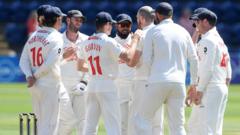Can Borg Tackle Cancer with the Tenacity of a Wimbledon Final?

Published: 2025-09-18 10:05:26 | Category: sport
Swedish tennis icon Bjorn Borg, renowned for his incredible achievements on the court, has revealed his diagnosis of "extremely aggressive" prostate cancer. In an emotional interview with BBC Breakfast, Borg expressed his determination to battle the illness, stating he would "fight every day like it's a Wimbledon final." This announcement has drawn widespread attention, not only for Borg's legendary status but also for raising awareness about prostate cancer, which affects many men globally.
Last updated: 12 October 2023 (BST)
Key Takeaways
- Bjorn Borg has been diagnosed with aggressive prostate cancer.
- He emphasises a fighting spirit, comparing his battle to a Wimbledon final.
- Borg's retirement at 25 left many shocked; he is a 11-time Grand Slam champion.
- Prostate cancer is a significant health issue for men, especially over 50.
- The interview highlights the importance of early detection and awareness.
Bjorn Borg: A Brief Overview
Bjorn Borg, often regarded as one of the greatest tennis players in history, dominated the sport in the late 1970s and early 1980s. He won 11 Grand Slam titles, including five consecutive Wimbledon championships from 1976 to 1980. Borg's style of play, characterised by his powerful serve and baseline play, revolutionised tennis. His unexpected retirement at the age of 25 shocked fans and experts alike, as many believed he had the potential to break numerous records.
Understanding Prostate Cancer
Prostate cancer is a common form of cancer among men, particularly those over the age of 50. It occurs when cells in the prostate gland grow uncontrollably, potentially spreading to other parts of the body. Symptoms may include difficulty urinating, blood in urine, or pelvic pain. However, in its early stages, prostate cancer may not show any symptoms, making regular screenings crucial.
What Are the Risks?
Several factors can increase the risk of developing prostate cancer, including:
- Age: Risk increases significantly after age 50.
- Family history: Having a father or brother with prostate cancer doubles the risk.
- Ethnicity: Men of African-Caribbean descent are at higher risk.
- Diet: A diet high in fat and low in fruits and vegetables may contribute to risk.
Borg's Response and Public Reaction
Borg's candid remarks during his interview reflect both vulnerability and resilience. He stated, "I hope I'm gonna be OK," showing a human side to the fierce competitor known for his stoicism on the court. His commitment to fight against the disease resonated with many, as he likened his approach to facing the challenges of a Wimbledon final. This statement has inspired others battling similar health challenges, highlighting the importance of mental strength in overcoming adversity.
Raising Awareness
The announcement of Borg's diagnosis serves as a reminder of the importance of awareness and understanding of prostate cancer. Advocacy groups stress the need for early detection and regular screenings, especially for men in high-risk categories. Borg's celebrity status can help amplify this message, encouraging more men to seek medical advice and undergo necessary tests.
The Importance of Early Detection
Early detection of prostate cancer can significantly improve treatment outcomes. Men are encouraged to discuss their risk factors with healthcare providers and consider screening options, especially as they age. The NHS recommends that men over 50, or those at higher risk, discuss the benefits and potential risks of prostate cancer screening with their doctor.
What Happens Next?
Moving forward, Borg's journey with prostate cancer will likely involve a combination of treatments tailored to his specific case. Options may include surgery, radiation therapy, hormone therapy, or chemotherapy, depending on the cancer's stage and aggressiveness. Borg's public battle may also help to destigmatise discussions around prostate health, encouraging more men to seek help without fear or embarrassment.
Conclusion
Bjorn Borg's diagnosis of aggressive prostate cancer is not just a personal battle; it is a call to action for many men to prioritise their health. As he faces this challenge, his story may inspire others to confront their health issues proactively. The tennis legend's fighting spirit reminds us that resilience is key, not only on the court but also in life. How will this impact the public’s perception of prostate cancer awareness?
#BjornBorg #ProstateCancer #HealthAwareness
FAQs
What is prostate cancer?
Prostate cancer is a form of cancer that develops in the prostate gland in men, often characterised by uncontrolled growth of prostate cells. It can vary in aggressiveness and may not show symptoms in early stages.
What are common symptoms of prostate cancer?
Common symptoms include difficulty urinating, blood in urine, painful urination, and pelvic discomfort. However, many men may not experience symptoms until the cancer is advanced.
At what age should men start screening for prostate cancer?
Men are generally advised to discuss screening options with their healthcare provider starting at age 50, or earlier if they have risk factors such as family history or ethnicity.
What treatments are available for prostate cancer?
Treatments for prostate cancer can include surgery, radiation therapy, hormone therapy, and chemotherapy, depending on the cancer's stage and severity.
How can I reduce my risk of prostate cancer?
To reduce the risk of prostate cancer, maintain a healthy diet rich in fruits and vegetables, exercise regularly, and discuss your risk factors with a healthcare provider.
Can men survive prostate cancer?
Yes, many men survive prostate cancer, especially with early detection and appropriate treatment. The prognosis varies based on the cancer's stage at diagnosis.



